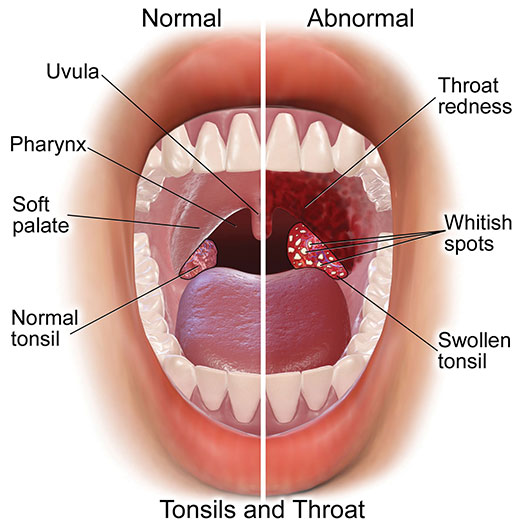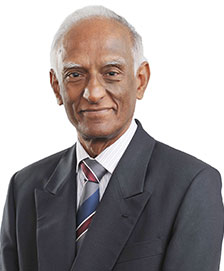Tonsil cancer is very uncommon cancer and relatively rare and living with a rare form of cancer can be challenging. Understanding what is happening and what to expect from treatment can make the process easier.
Q: What is tonsil cancer? How does it develop?
A: Tonsil cancer is the most common form of oropharyngeal malignancy, and its incidence is sharply rising due to the increasing prevalence of human papillomavirus (HPV)- induced cancers. The presence of HPV can dramatically alter the prognosis of tonsillar cancer, and there have recently been significant changes made to the WHO classification and TNM staging to reflect this. Tonsil cancer can be managed by both surgical and oncological approaches, although the optimal treatment regimen remains an area of ongoing research. Tonsil cancer begins when cancerous cells develop in the tonsils. It can occur in people who have had their tonsils removed, as some tonsil tissue often remains after surgery. Drinking alcohol, smoking, and having HPV appear to increase the risk. The tonsils sit toward the back of the throat, one on either side. They consist of lymphoid tissue, which contains lymphocytes, cells that fight off disease. The tonsils catch and destroy bacteria and viruses. They can change in size and often swell with blood to help trap germs, such as when a person has a cold. Tonsil cancer is often diagnosed late in the disease, when cancer has spread to nearby areas, such as the lymph nodes.

Q: What are the early and common symptoms?
A: Many people with tonsil cancer may not notice any symptoms even after they’re diagnosed.
The number one symptom of tonsil cancer is having one tonsil larger than the other. Another common symptom is a persistent sore throat. Symptoms depend on the size of the cancer. It’s not uncommon for the first symptom to be a lump in the neck.
Other symptoms may include:
- Change in your speaking voice quality
- Fatigue
- Unexplained weight loss
- Ear pain, especially on only one side, same side as affected tonsils.
- Difficulty swallowing or opening your mouth
- Bleeding from your mouth – very rare
Having one or more of these symptoms doesn’t mean you have tonsil cancer. Several noncancerous problems cause the same symptoms.
But it’s important to see a specialist if you have a tonsil infection that doesn’t get better with antibiotics or unexplained ear pain that doesn’t go away.

Q: Causes and what increases the risk of tonsil cancer?
A: In the past, the known risk factors for tonsil cancer were being older and using tobacco or alcohol. People who both smoke and drink heavily have double the chances of developing cancers in their throat. But now there seems to be an increased rate of tonsil cancer in patients who don’t smoke or drink. There is some evidence that it’s related to the human papillomavirus (HPV).
Those are still risk factors, but recently more young people who don’t smoke or drink are developing tonsil cancer, as well as other cancers in their throat or head and neck. The connection source seems to be human papillomavirus (HPV). HPV is a common virus associated with sexual contact. Tonsil cancer caused from HPV is a type of squamous cell carcinoma.
As with all cancers, tonsil cancer results from a combination of factors, including your genetics, behavior, and environment.
Q: Diagnosis and what do doctors look out for in assessing the disease?
A: Diagnosis for tonsil cancer might start with an exam of your mouth and throat. This cancer happens when abnormal cells form in the oval-shaped pads at the back of your throat, called tonsils.
The doctor might feel your throat for lumps and use a mirror and a bright light to examine the inside of your mouth. If any abnormal areas are found, a sample of cells might be cut away for lab testing or the whole tonsil need to be removed. You may also have imaging tests like CT, MRI, and PET.
Q: Stages in tonsil cancer and how patients are treated based on the extent of the cancer?
A: Treatment for tonsil cancer might be with an operation to remove the whole tonsil. This cancer happens when abnormal cells form in the oval-shaped pads at the back of your throat, called tonsils. Surgeons might be able to access small cancers through your mouth. Larger cancers might require removing the tonsil. Other treatment options might include radiation therapy with powerful energy beams and chemotherapy with appropriate drugs. Radiation therapy is offered because tonsil cancer responds well to it and it has less of an impact on swallowing and speaking than surgery.
In advanced cases, we use chemotherapy with the radiation therapy.

Q: What are the possible complications that might occur from treatment?
A: Recurrence of tonsil cancer, caught at an early stage, is very low, as it is with tonsil cancer caused by HPV.
Q: What is the additional support that are available for patients?
A: As usual, healthcare provider and staffs will provide patient’s counselling to the patients after all operation and treatments. Also, patients are advised to continue practice health lifestyle.

Q: Prevention: How can people lower their risk in getting the disease? Tips to prevent tonsil cancer
A: The best way to prevent cancer in the tonsils is to quit smoking any tobacco products or marijuana. Not chewing tobacco or using snuff also helps. Smoking is the largest cause of cancers in the head and neck.
Avoid being around smokers and in areas where smoking is common because second- hand smoke may also increase the chance of developing cancers in the head and neck.
Protect yourself from HPV by limiting the number of people you have sex with. Using a condom doesn’t protect you from HPV. Remember that HPV can also be spread during oral sex.
Protect your children from tonsil cancer in the future by allowing them to get the vaccine to prevent HPV infection before they have sex for the first time. The Center for Disease Control and Prevention recommends that all preteen girls and boys get the HPV vaccination.
See your doctor and dentist routinely. Because both examine your mouth, they can help find tonsil cancer early.
Q: Is there a screening for tonsil cancer?
A: Not presently. If you get a physical every year, ideally, your doctor can look in your mouth and see if you have one tonsil bigger than the other or any other symptoms. Many dentists detect tonsil cancer during a dental exam.
 Q & A with Mr S.P Palaniappan
Q & A with Mr S.P Palaniappan
Ear, Nose & Throat Surgery Specialist, Gleneagles Hospital Penang


